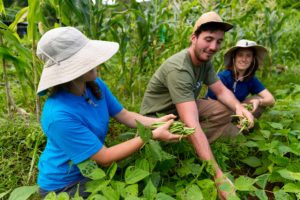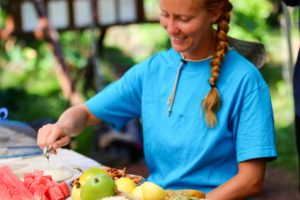By: Cynthia Albers, Admissions Coordinator

Harvesting fresh green beans from the garden
There is an onslaught of advice, cautions, directives and warnings supposedly to guide us toward a healthy lifestyle. So, what, exactly, does it mean to be healthy? What does healthy feel like? At Pacific Quest students are given the opportunity to ask themselves this same question and discern what that means to them by practicing the five pillars of health…and nutrition is on that list. I asked myself those questions starting around age 16 and now into my 7th decade, many choices, actions and paths have brought me to the happy condition of enjoying health. Undeniably, food and all that surrounds it, has played a big part. Here’s part of that story…
I grew up with 8 siblings, birth position 2, in Maryland, just south of the Mason-Dixon line. At age 6, our brood moved into a home my parents built in the country, where we kids quickly learned the joy and freedom of roaming the woods, waterfront and fields that were part of our new domain. Our diet was like that of most Americans of the era: 3 squares a day, with flesh featured at dinner; milk, kool-aid, water and the occasional soda pop for beverages; sandwiches of lunch meat or tuna on white Wonder Bread for school lunch, and hot or cold cereal with milk for most breakfasts. Stony Creek, an inlet to the Chesapeake Bay, supplied fresh fish and crabs, caught by our own hands, so seafood was frequently on the menu. A garden plot was carved out and tended by the clan. As kids, we hated it! All that work that took us away from exploring. But then, came the strawberries, cantaloupes, green beans, kale and corn on the cob, which we frequently ate right off the stalk ~ raw and full of sweet goodness! I began to realize how yummy these foods were, especially compared to the slimy, horrid mash that is canned spinach in the dead of winter. I was developing a deep connection to sourcing my own food, though I had no idea at the time.
Late summers were spent helping my mother with canning: prepping and blanching corn, tomatoes and green beans, then ladling the hot veggies into sterilized jars; turn ‘em upside down to wait for the tell-tale “Pop!” signaling the seal. In the damp coolness of Autumn we took frenzied forays into conifer forests, with cousins galore, each of us given a large brown paper grocery bag and entrusted with a serrated knife. We were set loose to find and sever the wild mushrooms that lay hidden in beds of pine needles. Now that was my kinda fun! Many bushel baskets were fungi-filled, and the families joined at our house for cleaning and sautéing the ‘shrooms with onions and butter, then filling quart plastic bags to be frozen. The bounty was distributed among the families and was served at holiday dinners all winter.
The desire to gather and grow food had inculcated my sensibilities and would last a lifetime.

Preparing a healthy meal at PQ
Fulfilling that desire has waxed and waned over the years, changing with occupation, domicile, region and season. On the shores of Hood Canal, Washington, oysters were free for the plucking and shucking, along with wild blackberries copious along roadways. Montana mountains gave huckleberries by the bucketful, boletes and coral mushrooms to fill the pot; hunter friends who shared venison, bear (yes, bear) and elk sausage satisfied my omnivore leanings. In Hawaii, where a third of my years were lived, our jungle homestead boasted 4 varieties of avocado, papayas, bananas, citrus, and required the patience of 2 years for white pineapples; collards were endless and found their way into nearly every dinner dish.
Now, home is the high desert mountains of the Southern Sierra, gardening in this arid climate with mostly granitic soil beckons an entirely new approach. Apricot, pomegranate and mulberry trees grow most willingly here and also resist the nibbling of deer above ground and gopher below. I’ll undoubtedly find ways to forage and grow food to fuel both the yearnings and health. Doing so feeds more than the just my body…it feeds my soul. Pacific Quest fosters ways for students and staff alike to build a meaningful connection to food and nutrition. May connections realized at PQ stay with each of us for a lifetime and fuel health for years to come.
Healthy Self = Heal + Thy + Self
By: Cynthia Albers, Admissions Coordinator There is an onslaught of advice, cautions, directives and warnings supposedly to guide us toward a healthy lifestyle. So, what, exactly, does it mean to be healthy? What does healthy feel like? At Pacific Quest students are given the opportunity to ask themselves this same question and discern what that …
By: Cynthia Albers, Admissions Coordinator
Harvesting fresh green beans from the garden
There is an onslaught of advice, cautions, directives and warnings supposedly to guide us toward a healthy lifestyle. So, what, exactly, does it mean to be healthy? What does healthy feel like? At Pacific Quest students are given the opportunity to ask themselves this same question and discern what that means to them by practicing the five pillars of health…and nutrition is on that list. I asked myself those questions starting around age 16 and now into my 7th decade, many choices, actions and paths have brought me to the happy condition of enjoying health. Undeniably, food and all that surrounds it, has played a big part. Here’s part of that story…
I grew up with 8 siblings, birth position 2, in Maryland, just south of the Mason-Dixon line. At age 6, our brood moved into a home my parents built in the country, where we kids quickly learned the joy and freedom of roaming the woods, waterfront and fields that were part of our new domain. Our diet was like that of most Americans of the era: 3 squares a day, with flesh featured at dinner; milk, kool-aid, water and the occasional soda pop for beverages; sandwiches of lunch meat or tuna on white Wonder Bread for school lunch, and hot or cold cereal with milk for most breakfasts. Stony Creek, an inlet to the Chesapeake Bay, supplied fresh fish and crabs, caught by our own hands, so seafood was frequently on the menu. A garden plot was carved out and tended by the clan. As kids, we hated it! All that work that took us away from exploring. But then, came the strawberries, cantaloupes, green beans, kale and corn on the cob, which we frequently ate right off the stalk ~ raw and full of sweet goodness! I began to realize how yummy these foods were, especially compared to the slimy, horrid mash that is canned spinach in the dead of winter. I was developing a deep connection to sourcing my own food, though I had no idea at the time.
Late summers were spent helping my mother with canning: prepping and blanching corn, tomatoes and green beans, then ladling the hot veggies into sterilized jars; turn ‘em upside down to wait for the tell-tale “Pop!” signaling the seal. In the damp coolness of Autumn we took frenzied forays into conifer forests, with cousins galore, each of us given a large brown paper grocery bag and entrusted with a serrated knife. We were set loose to find and sever the wild mushrooms that lay hidden in beds of pine needles. Now that was my kinda fun! Many bushel baskets were fungi-filled, and the families joined at our house for cleaning and sautéing the ‘shrooms with onions and butter, then filling quart plastic bags to be frozen. The bounty was distributed among the families and was served at holiday dinners all winter.
The desire to gather and grow food had inculcated my sensibilities and would last a lifetime.
Preparing a healthy meal at PQ
Fulfilling that desire has waxed and waned over the years, changing with occupation, domicile, region and season. On the shores of Hood Canal, Washington, oysters were free for the plucking and shucking, along with wild blackberries copious along roadways. Montana mountains gave huckleberries by the bucketful, boletes and coral mushrooms to fill the pot; hunter friends who shared venison, bear (yes, bear) and elk sausage satisfied my omnivore leanings. In Hawaii, where a third of my years were lived, our jungle homestead boasted 4 varieties of avocado, papayas, bananas, citrus, and required the patience of 2 years for white pineapples; collards were endless and found their way into nearly every dinner dish.
Now, home is the high desert mountains of the Southern Sierra, gardening in this arid climate with mostly granitic soil beckons an entirely new approach. Apricot, pomegranate and mulberry trees grow most willingly here and also resist the nibbling of deer above ground and gopher below. I’ll undoubtedly find ways to forage and grow food to fuel both the yearnings and health. Doing so feeds more than the just my body…it feeds my soul. Pacific Quest fosters ways for students and staff alike to build a meaningful connection to food and nutrition. May connections realized at PQ stay with each of us for a lifetime and fuel health for years to come.
Questions? Call or Text our Admissions Team: 808-937-5806